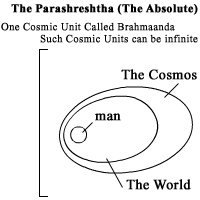|
Darshanaa means vision, seeing; what is implied
by the term is that truth and reality are directly perceived
and experiened. He who has envisioned it is a true philospher.
He is a darshaka. Such darshakas are called Maharishis. Yoga-vidyaa saadhanaa is the appropriate and powerful means of
reaching the supreme state of realization.
|
| |
|
Note The Schema:
|
| |
|

|
Note: Saadhanaa takes the vaamana,
the puny individual on terra-firma, and remakes him into Trivikrama,
the pervayor of the cosmos. Man is the miniature Brahmaanda.
You dug deeper into physical reality, you end-up in reaching
cosmic- reality. Saadhanaa surely takes one from here
to eternity.
|
|
|
|
Any philosophical investigation into the
realm of truth and reality must start from the self. The key
to realization surely lies within us and the practice of yoga
will actualize it.
Human body is essentially a cellular structure
with many organs and their intricate web of interactive functioning.
Then there are controlling systems, such as integumental,
skeletal, nervous, haemolymphoid, cardiovascular, respiratory,
alimentary, urinary, reproductive and endocrine. Indians posit
another control system over what is stated above. It consists
of manas (the mind), praanan (the vital and
dynamic force) and aatman (the soul). The entire physiological
aggregate is controlled by the above trinity with the help
of operative forces such as chemical, electrical, electro-magnetic
and the atomic.
Efficient body functioning implies a yogic
state of harmony. Like that of a baby. But the disjointed
and inharmonious functioning of man's physical aggregate and
the control systems has resulted in the sinful suffering.
This state of affair is called viyoga.
|
|
|
|
|
Yoga is the antonym of viyoga. Yoga
means the most harmonious functioning of the original life
system. The practical technique that brings about the yogic
harmony is called saadhanaa. It quickens the evolutionary
process that leads man, step by step, towards reaching perfection.
This state is called paramapadavi, the highest state
that nature has set man to reach. Moksha, meaning liberation,
results upon reaching paramapadavi. By liberation one
shall mean liberation from the crippling limitations of human
life. Life does not end in moksha; rather the door
into eternity opens up. That is all.
|
|
|
|
The yoga-saadhanaa that Shree
Achyutaashrama bestows to the ardent seekers has six well
defined stages. They are:
i.
Upadesha
ii.
Japah
iii.
Tapah
iv.
Saakshaatkaara
v.
Paramapadavi
vi.
Brahmatva
|
| |
|
Yogi Achyuta calls yoga as japah.
By japah is meant the preliminary stage of yoga. Japah takes place at the physical level, where not
much spiritual experience is expected. The persistent practice
of japah leads one to the stage of tapah.
|
|
|
|
Therefore, whenever the term japah
is used, it signifies the initial state of affair of yoga.
|